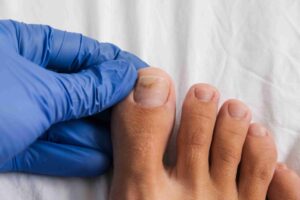Fallen Arches, Flexibility and Fear of missing out feet (FOMOF)
What does nail biting say about a person? Here at the clinic it is extremely common amongst children and young people to see toenail biting and picking. Nail biting / picking can be a difficult habit to break, but with patience and persistence, it is possible to overcome it. At the end of our Sunday newsletter today, we will share more about the condition ‘Onychophagia’ also known as Nail Biting.
Do you know someone who has a very reduced or extremely exaggerated foot arch? In both instances problems arise one because there can be too much rigidity and the other reduced support.
In the case of a pes planus or flat foot the tendons and fascia that blend to create the medial longitudinal arch have lost to differing degrees their pulley forces impacting the effectiveness of the arch ability to absorb and redirect forces from the ground.
However most children have fallen arches until they are about 6 years of age.
The reason children have flatter appearing feet is they are born with a fat pad in the developing arch and their bones are still developing with the joints
being very loose. As the child becomes ambulant the ligaments and muscles strengthen with the fat pad disappearing.
When the arches collapse or flatten it can lead to various symptoms and potential complications. Symptoms include pain or discomfort in the feet especially in the arches, heels or ankles. Swelling or stiffness in the feet and fatigued feet can be all be experienced.
Some Fallen Arches change causes
There are many reasons why you may have a pes planus / fallen arches. Some are genetic and some are due to external factors.
- An abnormality that is present at birth
- Stretched or torn tendons
- Damage or inflammation of the posterior tibial tendon, which connects from your lower leg, your ankle into the middle and underside of your arch
- A broken or dislocated bone(s)
- Some health conditions, such as rheumatoid arthritis.
- Nerve problems
Arch changes are common in people over 40 years. Diabetes, hypertension, and obesity are further risk factors. A damaged or stretched tendon can also be caused by high-impact sports like tennis, squash or football for instance.
Pes cavus, also known as high arch foot type, is a condition characterized by an abnormally high instep in the foot. There isn’t a single definitive cause of pes cavus and it can be attributed to a combination of factors.
Some possible causes and contributing factors include:
- Inherited or genetic factors: Pes cavus can run in families, suggesting a genetic predisposition to the condition.
- Neurological conditions: Certain neurological disorders such as Charcot-Marie-Tooth disease, cerebral palsy, spinal cord tumors, or muscular dystrophy can lead to the development of high arches.
- Muscle imbalances: Muscular imbalances in the foot, ankle, or lower leg can affect the arch structure and result in a high arch.
- Connective tissue disorders: Some connective tissue disorders, such as Ehlers-Danlos syndrome or Marfan syndrome, can be associated with pes cavus.
- Previous foot trauma: Injuries to the foot, such as fractures or sprains, can potentially cause an abnormal arch shape during the healing process.
What is Onychophagia?
The term “onychophagia” refers to the compulsive behavior of biting one’s nails. It is categorized as an impulse control problem and is thought to be a kind of body-focused repetitive behavior (BFRB). Onychophagia patients frequently struggle to control the temptation to bite their nails, and this habit can develop into a disruptive and persistent activity.
Causes
Onychophagia is thought to be impacted by a confluence of genetic, psychological, and environmental variables, however its specific causes are not entirely understood. It can occasionally be connected to stress, worry, boredom, or nervousness. It can also be a learned behavior, as people may pick up the practice by watching their family members or friends who bite their nails.
Onychophagia can have a variety of detrimental repercussions on a person’s physical and mental health. It can increase the risk of illnesses by allowing germs and other pathogens to spread from hands to mouth. Chronic nail-biting can harm the tissues around the nail and nail bed, resulting in discomfort, bleeding, and inflammation. Additionally, it may cause disfigured or ugly nails.
Tips on Reducing Nail Biting
Onychophagia, or the reduction of nail biting, can be difficult, but with some methods and techniques, you can attempt to break the habit. Here are some tips to help you reduce nail biting:
- Increase awareness: Pay attention to when and why you bite your nails. Understanding the triggers and situations that lead to nail biting can help you develop strategies to interrupt the habit.
- Substitute the behavior: Find an alternative action to replace nail biting. This could include using a stress ball, fidget toy, or keeping your hands occupied with something else. Experiment with different activities to find what works best for you.
- Keep your nails trimmed: Short nails are less tempting to bite. Regularly trim your nails to reduce the opportunity for nail biting. Consider getting a manicure to keep your nails well-groomed and less likely to be bitten.
- Practice relaxation techniques: Nail biting often occurs in response to stress, anxiety, or nervousness. Explore relaxation techniques such as deep breathing, meditation, or engaging in calming activities like yoga or taking a walk. These techniques can help manage the underlying emotions that may trigger nail biting.
- Practice good nail care: Take care of your nails by regularly moisturizing your hands and applying cuticle oil. This can make your nails and cuticles healthier, reducing the desire to bite them.
Are you suffering from any of these conditions? At The Chelsea Clinic, we can help. One of our podiatrist can assist and then recommend what treatments are best to get you back on track.  Podiatrist South Kensington
Podiatrist South Kensington
Schedule an appointment here or you may call us at +44 (0) 207 101 4000. 
We hope you have a feetastic day! 

-The Chelsea Clinic and Team


 Podiatrist South Kensington
Podiatrist South Kensington




